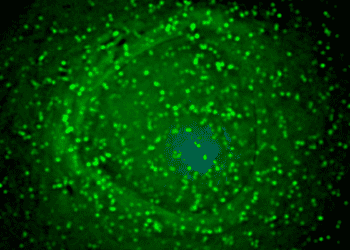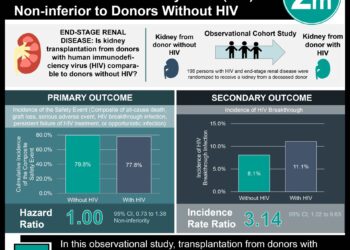PTX3 gene deficiency may increase the risk of invasive aspergillosis in transplant patients
Image: PD
1. Hematopoeitic stem-cell transplant (HSCT) patients who received donor cells with a PTX3 haplotype of h2/h2 had an increased risk of infection.
2. PTX3 gene deficiency in h2/h2 neutrophils was associated with impaired phagocytosis and clearance of aspergillosis.
Evidence Rating Level: 2 (Good)
Study Rundown: Long Pentraxin 3 (PTX3) is a soluble protein produced by phagocytes and nonimmune cells. It acts as an opsonin to fungal conidia and plays an essential role in immune resistance to Aspergillus fumigatus. These fungal infections are of particular significance in high-risk patients. 5-15% of patients undergoing allogeneic hematopoietic stem-cell transplantation (HSCT develop invasive aspergillosis as a complication. The authors of this study identified an increased risk of infection in patients undergoing HSCT from donors with the h2/h2 haplotype. Neutrophils from these patients were significantly impaired in their ability to phagocytose conidia of A. fumigatus. This deficit was reversed with the exogenous addition of PTX3, demonstrating that the lack of PTX3 compromises the innate antifungal mechanisms. These findings could give physicians the ability to identify higher risk patients before infection develops, allowing for better clinical management and earlier interventions. Additional studies are needed to further elucidate the mechanism of PTX3 and how its deficiency affects other aspects of the immune system.
Click to read the study in NEJM
Relevant Reading: Pentraxins in innate immunity: Lessons from PTX3
Study Author, Dr. Agostinho Carvalho, PhD, talks to 2 Minute Medicine: Department of Experimental Medicine, University of Perugia
“Our large multicenter study shows that genetic analysis of the PTX3 gene might be potentially used to identify recipients of allogeneic stem cell transplants at high risk of invasive aspergillosis. The study, which correlated genetic variation with defective immune responses, opens new possibilities for the use of PTX3 in antifungal prophylaxis and therapy.”
In-Depth [prospective cohort]: This study aimed to identify what, if any, role PTX3 played in the development of invasive aspergillosis in hematopoietic stem-cell transplant (HSCT) patients. The authors first gathered data from a single hospital between 2003 and 2011. Patients were excluded if they were enrolled in other clinical studies, developed infections with molds other than aspergillus species or had mold infections prior to transplantation. The authors screened DNA from 278 HSCT recipient-donor pairs by analyzing the PTX3 gene for 22 different single nucleotide polymorphisms (SNPs). They then assessed the risk of invasive aspergillosis according to the recipient or donor PTX3 type. They found that patients whose donor PTX3 was of the haplotype h2/h2 had a cumulative incidence of invasive aspergillosis of 37%, compared to 15% of those with other haplotypes (p = 0.001, with adjusted hazard ratio 3.08, 95% CI 1.47-6.44; p = 0.003). There was no association between recipient PTX type and aspergillosis infection. The authors then performed a multi-center case-control study enrolling 107 patients with invasive aspergillosis and 223 matched controls. They again found the association with donor haplotype h2/h2 and risk of invasive aspergillosis (adjusted odds ratio 2.79, 95% CI 1.22-8.93, p=0.03). They additionally found lower levels of PTX3 in lung tissue and lung fluid from patients with the h2/h2 haplotype. In a series of basic studies, they also found that h2/h2 neutrophils had impaired phagocytic activity compared to h1/h1 neutrophils.
More from this author: Pneumocystis linked to sudden infant deaths, Continuous infusion of beta-lactams may be superior to bolus therapy, Novel antiviral drug reduces influenza viral load, Three months of antibiotics appear to effectively treat early-onset spinal implant infections
© 2012-2014 2minutemedicine.com. All rights reserved. No works may be reproduced without expressed written consent from 2minutemedicine.com. Disclaimer: We present factual information directly from peer reviewed medical journals. No post should be construed as medical advice and is not intended as such by the authors, editors, staff or by 2minutemedicine.com. PLEASE SEE A HEALTHCARE PROVIDER IN YOUR AREA IF YOU SEEK MEDICAL ADVICE OF ANY SORT.








